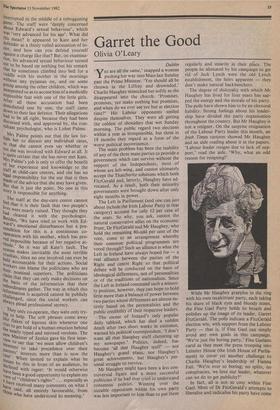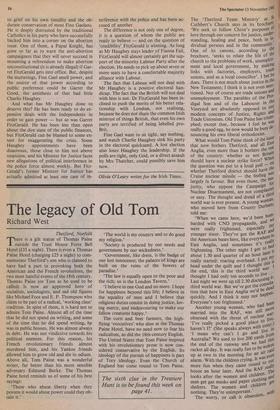Garret the Good
Olivia O'Leary
Dublin
`Vez are all the same,' snapped a woman
1_ pushing her way into Mass last Sunday past the Prime Minister. `Yez should all be thrown in the Liffrey and drownded.' Charlie Haughey mimicked her softly as she disappeared into the church. 'Promises, promises, yez make nothing but promises, and when do we ever see yez but at election time?' His Labour opponents smiled despite themselves. They were all getting the coldest of shoulders that wet Sunday morning. The public regard two elections within a year as irresponsible, but three in 18 months they regard as a form of the worst political incontinence. 1_ pushing her way into Mass last Sunday past the Prime Minister. `Yez should all be thrown in the Liffrey and drownded.' Charlie Haughey mimicked her softly as she disappeared into the church. 'Promises, promises, yez make nothing but promises, and when do we ever see yez but at election time?' His Labour opponents smiled despite themselves. They were all getting the coldest of shoulders that wet Sunday morning. The public regard two elections within a year as irresponsible, but three in 18 months they regard as a form of the worst political incontinence. The main problem has been the inability of any of the three main parties to provide a government which can survive without the support of the Independents, most of whom are left-wing, and cannot ultimately accept the Thatcherite solutions which both FitzGerald and, latterly, Haughey have ad- vocated. As a result, both their minority governments were brought down after only eight months in power. The Left in Parliament (and one can just about include the Irish Labour Party in that category) account for only 12 per cent of the seats. So why, you ask, cannot the natural conservative allies on the economic front, Dr FitzGerald and Mr Haughey, who hold the remaining 80-odd per cent of the vote, come to an arrangement whereby their common political programmes are voted through? Such an alliance is what the Left in Ireland have always hoped for — a real alliance between the parties of the Right and centre Right so that political debate will be conducted on the basis of ideological differences, not of personalities or of the traditions of nationalism. Since the Left in Ireland command such a minori- ty position, however, they can hope to hold little more than a balance of power between two parties whose differences are almost en- tirely based on the personalities and the public credibility of their respective leaders. The owner of Ireland's only popular daily tabloid, which has died a sudden death after two short weeks in existence, warned his political correspondent, 'I don't want all that Haughey stuff cluttering up my newspaper.' Politics, indeed, has become 'all that Haughey stuff' — not Haughey's grand plans, nor Haughey's great achievements, but Haughey's per- sonal struggle to survive. Mr Haughey might have been a less con- troversial figure and a more successful politician if he had ever tried to understand consensus politics. Winning over the sizeable opposition within his own party was less important to him than to put them regularly and smartly in their place. The people he alienated by his campaign to get rid of Jack Lynch were the old Lynch establishment, the heirs apparent — they don't make natural backbenchers.
The degree of disloyalty with which Mr Haughey has lived for four years has sap- ped the energy and the morale of his party. The polls have shown him to be an electoral liability. Strong feelings about his leader- ship have divided the party organisation throughout the country. But Mr Haughey is not a resigner. On the surprise resignation of the Labour Party leader this month, an Irish Times cartoon showed Mr Haughey and an aide reading about it in the papers. `Labour leader resigns due to lack of sup- port,' read the aide. 'Why, what an odd reason for resigning!'
While Mr Haughey grapples in the ring with his own recalcitrant party, each taking his share of black eyes and bloody noses, the Fine Gael Party holds its breath and polishes up the image of its leader, Garret FitzGerald. The polls indicate a FitzGerald election win, with support from the Labour Party — that is, if Fine Gael can simply avoid any own goals in this campaign. `We're just the boring party,' Fine Gaelans carol as they meet the press trooping into Leinster House (the Irish House of Parlia- ment) to cover yet another challenge to Charlie Haughey's leadership of Fianna Fail. 'We're ever so boring; no splits, no conspiracies, we love our leader, whatever can we do to get publicity?'
In fact, all is not so cosy within Fine Gael. Most of Dr FitzGerald's attempts to liberalise and radicalise his party have come to grief on his own timidity and the ob- durate conservatism of most Fine Gaelans. He is deeply distrusted by the traditional Catholics in his party who have successfully backed him into a corner on the abortion issue. One of them, a Papal Knight, has gone so far as to warn the anti-abortion campaigners that they will never succeed in mounting a referendum to make abortion unconstitutional (it is already illegal) if Gar- ret FitzGerald gets into office. But, despite the mutterings, Fine Gael smell power, and the source of that power according to public preference could be Garret the Good, the antithesis of that bad little Charlie Haughey.
And what has Mr Haughey done to deserve this? He has been ready to do ex- pensive deals with the Independents in order to gain power — but so was Garret FitzGerald. He has been less than open about the dire state of the public finances, but FitzGerald can be blamed to some ex- tent for exaggerating the crisis. Some Haughey appointments have been disastrous, those close to him not above suspicion, and his Minister for Justice faces new allegations of political interference in the police force almost weekly. But Fitz- Gerald's former Minister for Justice has actually admitted at least one case of in- terference with the police and has been ac- cused of another.
The difference is not only one of degree, it is a question of whom the public are ready to believe — and on the question of 'credibility' FitzGerald is winning. As long as Mr Haughey stays leader of Fianna Fail, FitzGerald will almost certainly get the sup- port of the minority Labour Party after the election. He needs to pick up about seven or more seats to have a comfortable majority alliance with Labour.
The fact that Labour will not deal with Mr Haughey is a positive electoral han- dicap. The fact that the British will not deal with him is not. Dr FitzGerald has been in- clined to push the merits of his better rela- tionship with London, not realising, because he does not share the common Irish mistrust of things British, that even his own party are terrified of being labelled pro- Brit.
Fine Gael want to sit tight, say nothing, and watch Charlie Haughey sink his party in the electoral quicksand. A lost election also loses Haughey the leadership. If the polls are right, only God, or a direct assault by Mrs Thatcher, could possibly save him now.
Olivia O'Leary writes for the Irish Times.















































 Previous page
Previous page